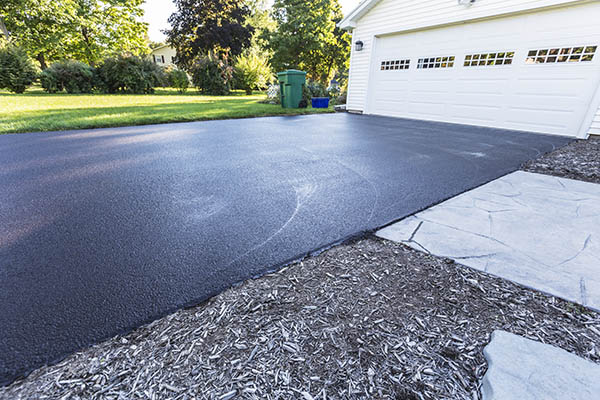Renew Your Residential Or Commercial Property with Regrading and Asphalt Sealing Methods
Renew Your Residential Or Commercial Property with Regrading and Asphalt Sealing Methods
Blog Article
Hot Mix Asphalt: A Sustainable Option for Sidewalk
Warm Mix Asphalt (HMA) has emerged as a leading sustainable option for sidewalk solutions, offering a myriad of ingenious modern technologies and ecological benefits. As the need for environment-friendly construction techniques expands, exploring the nuances of HMA's sustainability can supply important insights into the future of pavement solutions.
Ecological Advantages of Hot Mix Asphalt

Furthermore, Warm Mix Asphalt assists to minimize urban heat island results. Its dark shade soaks up sunlight, reducing the quantity of warm mirrored back into the ambience compared to lighter-colored sidewalks. This can reduce ambient temperatures in metropolitan locations, decreasing the demand for cooling and ultimately lowering power intake.
On top of that, Hot Mix Asphalt contributes to boosted stormwater administration. Its porous nature allows water to charge and penetrate the sidewalk groundwater materials, reducing overflow and the danger of flooding. These environmental advantages make Hot Mix Asphalt a lasting option for leading freeways and roads.
Energy Efficiency in HMA Manufacturing
Is energy efficiency an important factor in the manufacturing of Warm Mix Asphalt (HMA)? Absolutely. Energy plays a significant role in the production of HMA, affecting both expense and environmental sustainability. One essential element of power performance in HMA manufacturing is the usage of cozy mix asphalt (WMA) innovations (hot mix asphalt). WMA permits the mixing and positioning of asphalt at lower temperatures contrasted to traditional hot mix asphalt, causing decreased power consumption during manufacturing. This process not just decreases gas usage however also decreases greenhouse gas discharges, making it an extra eco friendly choice.
In addition, developments in plant modern technologies have actually led to even more energy-efficient HMA production procedures. By maximizing power use in HMA production, the industry can decrease its carbon impact while keeping high-quality pavement materials.
Recyclability of Hot Mix Asphalt
The recyclability of Hot Mix Asphalt (HMA) is an essential aspect of its sustainability and long-lasting environmental impact. HMA is among one of the most recycled materials in the USA, with over 100 million lots of redeemed asphalt sidewalk (RAP) being reused yearly in new pavement construction. Reusing HMA provides numerous environmental benefits, such as decreasing the demand for virgin products, reducing energy usage throughout manufacturing, and decreasing the amount of waste sent out to landfills.
The procedure of recycling HMA includes grating the existing sidewalk, crushing it into smaller pieces, and blending it with brand-new accumulation and asphalt binder to create a recycled mix. This recycled mix can usually perform as well as or perhaps better than standard HMA, while requiring fewer raw materials and creating reduced greenhouse gas discharges. By integrating RAP right into brand-new sidewalk projects, roadway firms can save all-natural sources, lower expenses, and lessen the environmental impact of roadway building and construction and maintenance tasks. On the whole, the recyclability of HMA plays a considerable role in advertising sustainable techniques within the pavement market.

Long-Term Performance of HMA
Asphalt sidewalks demonstrate resilience and resilience over an extensive duration, showing the long-term efficiency of Hot Mix Asphalt (HMA) Furthermore, advancements in HMA innovation, such as the usage of i thought about this polymer-modified binders and warm mix asphalt, have additionally improved the sturdiness and durability of HMA sidewalks. By focusing on high quality building and construction and upkeep practices, HMA continues to show itself as a cost-effective and sustainable service for lasting sidewalk facilities.

HMA: Sturdiness and Sustainability
Demonstrating both durability and sustainability, Warm Mix Asphalt (HMA) has come to be Visit This Link a keystone in the construction of resilient pavement frameworks - angled parking. HMA's resilience originates from its capability to endure hefty lots, severe weather condition conditions, and high traffic volumes, making it a reliable choice for streets, freeways, and flight terminal runways. The composition of HMA, which usually includes accumulations, binder, and filler, plays a crucial function in enhancing its longevity and resistance to tear and put on
In addition, HMA's sustainability depends on its recyclability and energy-efficient manufacturing process. The ability to recycle redeemed asphalt pavement (RAP) in new HMA mixes minimizes the need for virgin materials and lessens the ecological effect of pavement building and construction and maintenance. Furthermore, the power efficiency of creating HMA hinges on its reduced mixing temperatures compared to other pavement products, resulting in decreased power intake and greenhouse gas emissions.
Conclusion
Finally, hot mix asphalt (HMA) supplies a lasting service for sidewalk with its ecologically friendly features. HMA's recyclability, energy effectiveness in manufacturing, and lasting resilience make it a green choice for road construction. By preserving natural resources, decreasing waste, and reducing greenhouse gas discharges, HMA plays an essential function in promoting sustainability in framework advancement. Its capability to minimize city warmth island impacts further emphasizes its value in creating resistant and environmentally conscious pavement systems.
HMA is one of the most recycled products in the United States, with over 100 million heaps of redeemed asphalt pavement (RAP) being reused yearly in brand-new pavement construction.The procedure of recycling HMA includes milling the existing additional resources pavement, squashing it into smaller sized pieces, and blending it with new accumulation and asphalt binder to develop a recycled mix.Asphalt sidewalks demonstrate toughness and durability over an extensive period, mirroring the long-term efficiency of Hot Mix Asphalt (HMA) Additionally, developments in HMA technology, such as the usage of polymer-modified binders and warm mix asphalt, have actually even more enhanced the sturdiness and durability of HMA sidewalks. The capability to reuse reclaimed asphalt sidewalk (RAP) in new HMA blends minimizes the demand for virgin materials and decreases the environmental effect of sidewalk building and maintenance.
Report this page